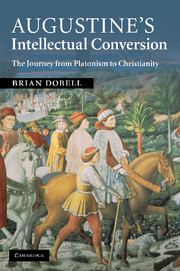Book contents
- Frontmatter
- Contents
- Preface
- Note on translations and references
- Chronological table of Augustine's writings
- List of abbreviations and texts
- Introduction: Augustine's conversion to Christianity
- PART I THE WAY OF AUTHORITY AND ‘THE FALSITY OF PHOTINUS’
- PART II THE WAY OF REASON AND THE ASCENT OF THE SOUL
- Conclusion: Augustine the Porphyrian
- Appendix: true and false in Soliloquies II
- Bibliography
- Index
Introduction: Augustine's conversion to Christianity
Published online by Cambridge University Press: 01 June 2010
- Frontmatter
- Contents
- Preface
- Note on translations and references
- Chronological table of Augustine's writings
- List of abbreviations and texts
- Introduction: Augustine's conversion to Christianity
- PART I THE WAY OF AUTHORITY AND ‘THE FALSITY OF PHOTINUS’
- PART II THE WAY OF REASON AND THE ASCENT OF THE SOUL
- Conclusion: Augustine the Porphyrian
- Appendix: true and false in Soliloquies II
- Bibliography
- Index
Summary
Augustine of Hippo (354–430 ce) was not only concerned with his own self-promotion but also eminently endowed with the rhetorical skills to convey the desired image of himself. For evidence of this we need look no further than his Confessions, in which the newly appointed bishop provides us with his version of events leading up to his conversion to Christianity in 386. While debates have arisen over the truth of the story – it has even been argued that Augustine was converted in 386 not to Christianity but to Neoplatonism – the narrator's account has set the terms of the debate so completely that his readers have accepted his judgement that the defining moment of his life was his conversion in 386 (whether it was to Christianity or Neoplatonism or some mixture of the two). O'Donnell sounds a cautionary note here:
It remains the assumption, in short, of all modern biographers – hostile, friendly, and merely attentive – that a “conversion” in Milan, on or about the time of 386, is the central and most powerful explanatory fact about Augustine's life. Augustine would be pleased that we agree with him so readily.
But perhaps we should not. Perhaps Augustine, in telling this story about himself, had interests and purposes he could not avow. Perhaps this retrospective story, which first appears almost a decade later in something like its Confessions form, is creating a structure for the past that is not irrefutable.
Information
- Type
- Chapter
- Information
- Augustine's Intellectual ConversionThe Journey from Platonism to Christianity, pp. 1 - 28Publisher: Cambridge University PressPrint publication year: 2009
